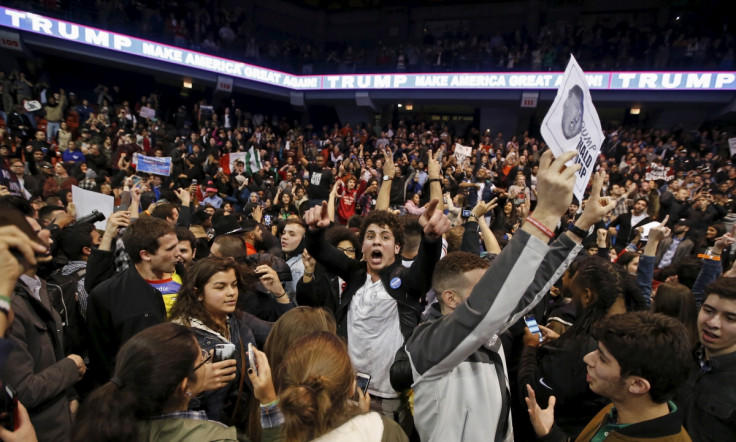Who is Jedidiah Brown, the pastor who stormed Donald Trump's rally in Chicago?

Jedidiah Brown is making headlines in both the US and UK while the gaze of social media is fixed firmly on the 29-year-old who stormed the stage at a Donald Trump rally in Chicago on 11 March. The Republican frontrunner was forced to cancel the University of Illinois event following violent clashes between his supporters and protesters.
Activist Pastor #jedidiahbrown @livelifefreed during the Chicago Donald Trump rally pic.twitter.com/sfkmzJftAj
— Dub Dynasty (@dub_dynasty) March 12, 2016
A Trump supporter with a flag of the US could be seen trading blows with Brown, who claimed that bottles had been thrown at him at various points. He said that he had also been spat at, told to "go back to Africa" and during an interview, Brown asserted that Trump supporters had been "the physical ones" and "the violent ones".
Previous Trump rallies have also seen physical assaults against black people, including the repeated shoving of student Kayisha Nwanguma and an attack on Rakeem Jones, who was punched in the face by John Franklin McGraw.
Astoundingly, the 78-year-old defended his actions, saying what he "liked" about the event was punching Jones. He added: "The next time we see him, we might have to kill him."
Who is Jedidiah Brown?
Brown is an ordained pastor and president of the Young Leaders Alliance, which aims to "develop platforms and opportunities to inspire the young to influence the leadership table" in Chicago. It was started in February 2013 as a not-for-profit community organisation.
Brown was also previously a fifth ward city council candidate. He has been credited with galvanising people to unite around a shared vision to make neighbourhoods safer and exploring alternative ways of conflict resolution rather than resorting to violence to solve problems.
In an effort to take back Chicago's neighbourhoods, Brown tracked the city's violence to reach out to families of victims and connect with those seeking to carry out reprisal attacks.
"The first few moments after a shooting are the most important," he told dnainfo.com in 2014. "Maybe there's somebody at the scene who will tell me something they're not comfortable telling police."
This bold outreach effort almost cost him his life after he found himself in the middle of an escalating conflict between two groups who were arguing over a girl. After Brown tried to defuse the situation, he was shot at, but miraculously managed to escape unscathed after fleeing into Humboldt Park.
In an unusual twist, the man who shot at Brown rang him to apologise and the pastor offered him a deal: spend one day with him and he wouldn't be reported to the police. So what was his motive for shielding the man from law enforcement?
"I'm not doing any of this for money," he said. "I care about Chicago. I love my city," Brown added. "This is everybody's problem, it's everybody's fault."
© Copyright IBTimes 2025. All rights reserved.





















